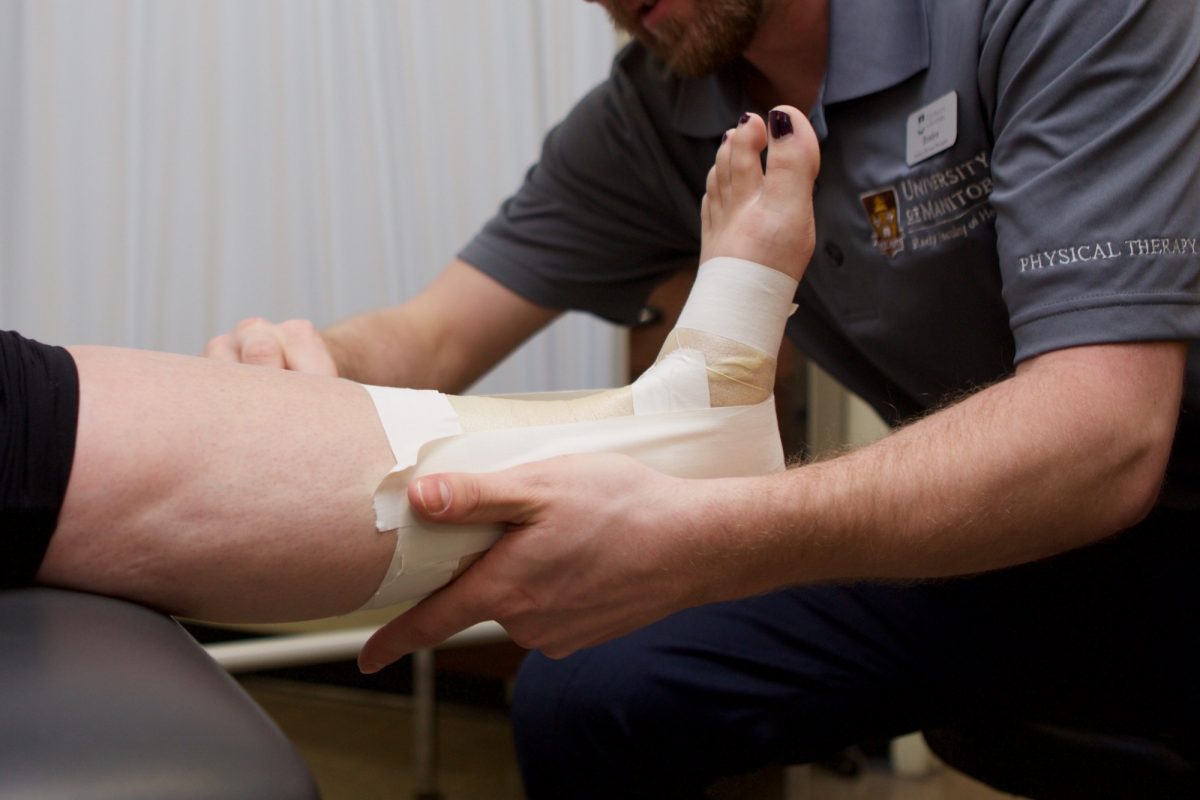
PHYSIOTHERAPY IS ONE OF SIX HEALTH-CARE FIELDS ON WHICH THE ACCESS HUB WILL FOCUS.
UM to help foreign-trained health professionals qualify for Manitoba practice
A new resource hub at the University of Manitoba will help internationally educated pharmacists, physiotherapists, occupational therapists and other health professionals qualify for practice in Manitoba.
The Rady Faculty of Health Sciences has received more than $735,000 to create an Access Hub for Internationally Educated Health Professionals. The project is funded by the Government of Canada’s Foreign Credential Recognition Program.
“This central hub will help highly skilled newcomers navigate all the requirements to earn their licences, get registered in their professions and enter the Manitoba workforce faster than they typically do now,” said Natalie MacLeod Schroeder, the hub’s director.
“Our goal is to establish a single point of contact to streamline the supports that are already available and introduce new educational and employment supports.”
“Attracting talented workers from around the world is essential to help grow the Canadian economy and support its recovery from the COVID-19 recession,” said Carla Qualtrough, minister of employment, workforce development and disability inclusion.
“By funding this project, the Government of Canada is helping more skilled newcomers in the health field get the support they need to integrate faster into the Canadian job market.”
The Access Hub, which has initial funding until early 2023, will be based in the Rady Faculty’s Office of Continuing Competency and Assessment. It will start offering services in the summer or fall of 2021.
The Rady Faculty currently offers in-demand “bridging” programs to prepare foreign-trained doctors and dentists for accreditation in Canada. Red River College runs the bridging program for nurses.
The new hub will advise any health professional with foreign credentials, but will particularly target newcomers in six fields that lack bridging programs in Manitoba: pharmacy, occupational therapy, physiotherapy, respiratory therapy, speech language pathology and audiology.
“Guiding newcomers to attain employment in their fields helps to retain them in the province and benefits the health-care system, particularly as we address the human resource challenges of COVID-19,” said Dr. Christine Polimeni, vice-dean of continuing competency and assessment.
A key innovation of the hub is that it will allow professionals with foreign credentials to take individual courses – including clinical fieldwork courses – within UM programs such as pharmacy, physical therapy and occupational therapy.
“For the first time, this will enable newcomer professionals to fill gaps in their educational qualifications without having to enrol in an entire, full-time UM program,” said Polimeni.
About 320 internationally educated individuals from the six targeted fields applied to practise in Manitoba from 2015 to 2017. Nearly three-quarters were pharmacists. Their success rate for obtaining registration ranged from 18 per cent for occupational therapists to 70 per cent for pharmacists.
Many health professionals who arrive from other countries face barriers to entering practice, MacLeod Schroeder said. First, they must pay to have their qualifications assessed. (Respiratory therapists must travel to Ontario to be assessed – a barrier the hub project hopes to address.) Then, if gaps are identified in their educational or fieldwork backgrounds, it can be confusing and daunting to remediate those gaps.
“It can be very difficult to arrange for yourself to be supervised in a clinical setting if you don’t have a network in Canada,” said MacLeod Schroeder. “Pharmacists, for example, are required to complete 600 hours of supervised practice.”
The hub will not only inform newcomers about the entry-to-practice process and refer them to resources, but will also offer educational resources, such as online modules covering health-care competencies such as communication, professionalism and ethics.
Modules or workshops will also be offered to encourage more licensed professionals in Manitoba to act as preceptors (mentors who supervise learners during clinical placements) for newcomers.
The Access Hub for Internationally Educated Health Professionals is believed to be the first such initiative in Canada that is an interprofessional, collaborative effort between the regulatory bodies for health professions, the health science programs at a university, and health-care employers.
MacLeod Schroeder hopes to assist 400 to 500 newcomer professionals during the hub’s initial phase.







Great initiative
Great initiative
This is great news!
What good news, I am already wanting to go to Canada to improve myself in the area of Respiratory Therapy
I am happy to know that this gap hopefully will be addressed and that foreign trained healthcare professionals will be given a chance and can be of help in the community.